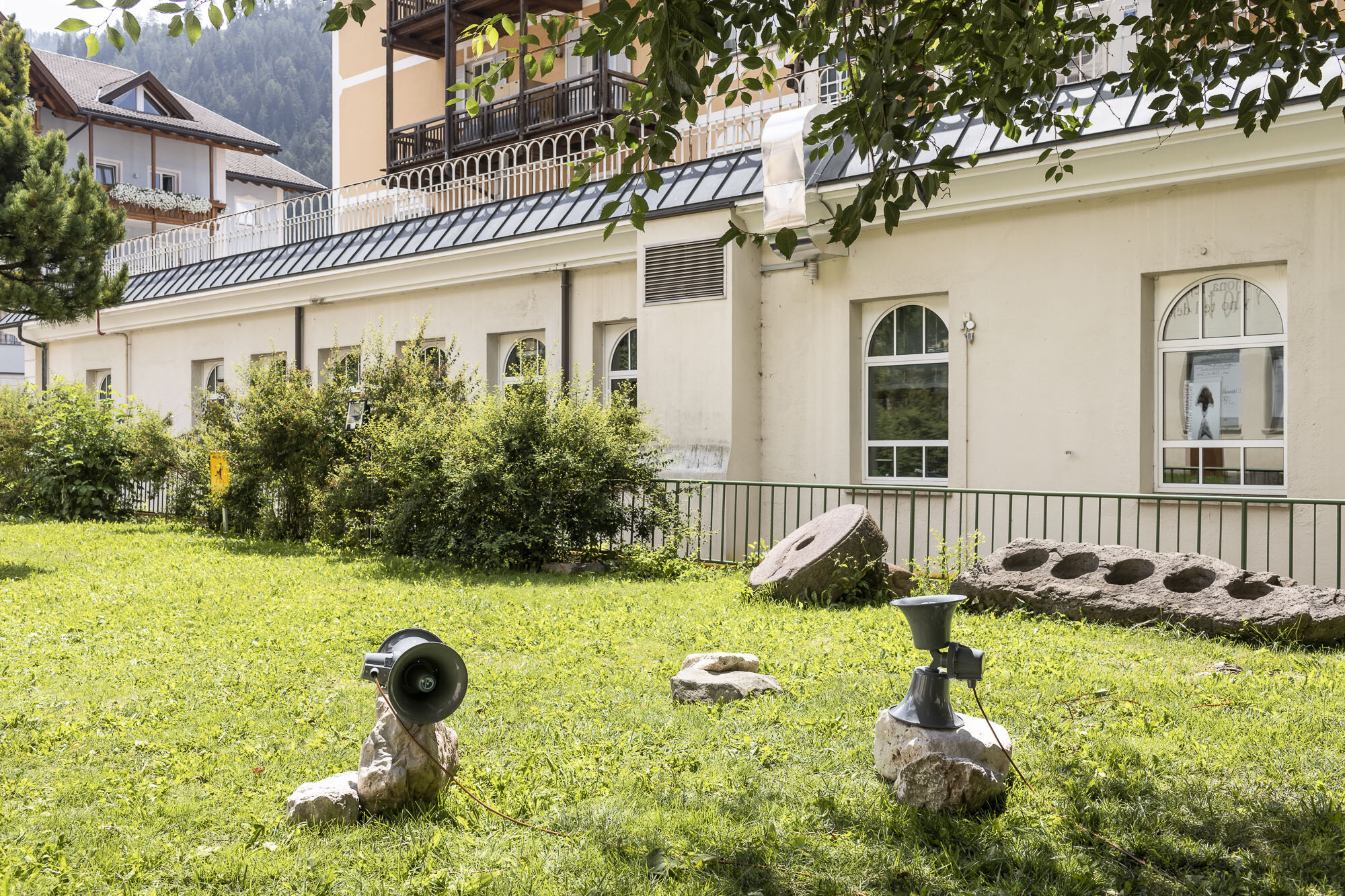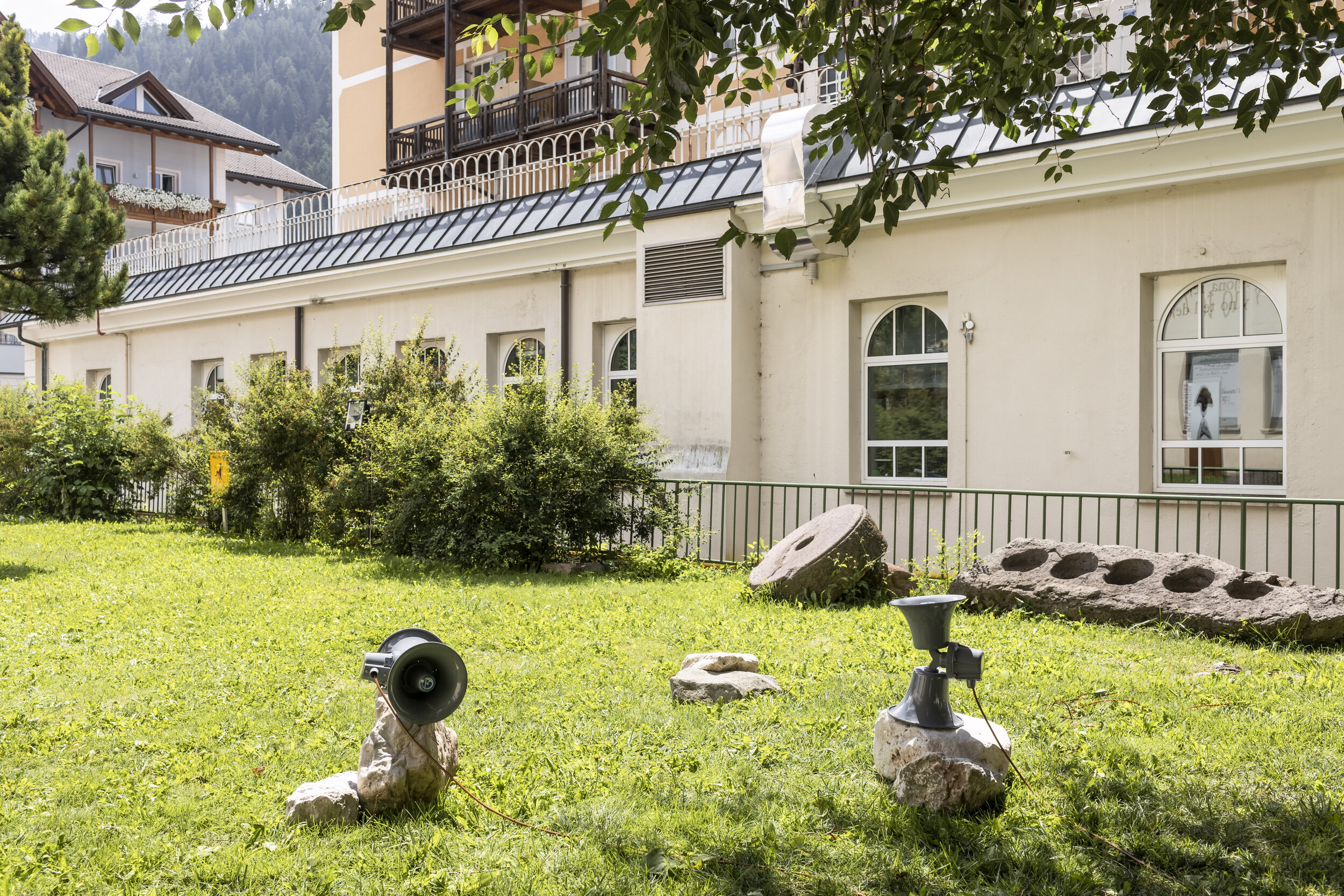
Pavel Büchler
*1952, Czechoslovakia
lives and works in Manchester, United Kingdom
EN
Pavel Büchler (*1952, Czechoslovakia) Pavel Büchler is known for his pioneering conceptual work with language, obsolete technology and the moving image, as well as his long career as an influential teacher and writer. Focusing on subverting the codes of everyday life or deconstructing iconic texts from the history of literature and science, Büchler’s multimedia practice incorporates performance, photography, installation, writing and books. Sound – often appropriated and reworked – belongs to his favourite means of artistic expression.
A sense of transience and nostalgia is evoked in the sound installation Dialogo sopra i due massimi sistemi del mondo (2013). The two channel sound installation broadcasts a fragment from Galileo Galilei “Dialogue Concerning the Two Chief World Systems” (1632), a treatise on the old Ptolemaic versus the new Copernican system, in which Galilei, as the founding father of the modern natural sciences, no long longer defines Earth, but the Sun as the central body in our planetary system. The artist is concerned with the representational systems, both communicative and epistemological, as the protagonists in a selected fragment tellingly speak about their doubts and their fears of loss of orientation in view of the radical issues in question. This dialogue he translates into the coded communication tool of Morse code, supplementing it with the sounds of the fog horns of Cape Arago and Vancouver.
Another work in public space is the neon writing “Open”, an adaptation of the historical inscription “Pension” on the façade of the Hotel Ladinia, the historical inn at the heart of St. Ulrich/Ortisei that shut its doors years ago and was reopened just for the duration of the Biennale Gherdëina to serve as an exhibition venue. Through the simple shifting of individual letters of the original inscription the word “Pension” turned into “Open” and thus, also in times of a pandemic and their restrictions, or because of them, became a subtly positioned, yet central symbol of this biennial.
The text installation “Problem gelöst” (2016) consists of a series of framed prints bearing the inscription “Mögen andere kommen und es besser machen” (May others come and do it better). Once again, the artist intervenes in a subtly ironic manner in order to subvert and to question our daily routine and habits. Working with texts that reflect everyday life and its experience in art is an essential aspect of Büchler’s practice. According to Pavel Büchler, art changes the world and our perception, not by producing works, but by interacting in the world.
IT
Pavel Büchler (*1953 Repubblica Ceca) è noto per il suo lavoro concettuale innovativo sul linguaggio, la tecnologia obsoleta e l’immagine in movimento, oltre che per la sua lunga carriera di autorevole insegnante e scrittore. La pratica multimediale di Büchler, che mira a sovvertire i codici della vita quotidiana o a decostruire testi iconici della storia della letteratura e della scienza, comprende performance, fotografia, installazione, scrittura e libri. Il suono, di cui spesso si appropria modificandolo, è uno dei suoi mezzi di espressione artistica preferiti.
L’installazione sonora “Dialogo sopra i due massimi sistemi del mondo” (2013) evoca un sentimento di transitorietà e nostalgia. Il lavoro a due canali trasmette un frammento del “Dialogo sui due principali sistemi mondiali” (1632) di Galileo Galilei, un trattato in cui il vecchio sistema tolemaico viene messo a confronto con quello copernicano e dove Galilei, padre della scienza moderna, afferma che al centro del nostro sistema planetario si trova il Sole e non, come si credeva, la Terra. Interessato ai sistemi di rappresentazione, sia comunicativi che epistemologici, Pavel Büchler ha selezionato un frammento del dialogo in cui i protagonisti parlano dei loro dubbi e timori di disorientamento di fronte ai temi trattati. Il frammento è stato quindi tradotto in codice Morse e trasmesso dai suoni dei nautofoni dei porti di Capo Arago e Vancouver.
Un’altra opera dell’artista presente nello spazio pubblico è l’insegna luminosa “Open”, un adattamento della storica insegna “Pensione” sulla facciata dell’Hotel Ladinia, una struttura storica nel centro di Ortisei ormai in disuso da anni e riaperta eccezionalmente in occasione della Biennale di Gherdëina come sede espositiva. Spostando semplicemente alcune lettere della parola originaria, la parola “Pensione” si trasforma nella parola “Open” (aperto), diventando così un intervento quasi invisibile ma centrale di questa Biennale, soprattutto se messo in relazione con quest’epoca di pandemia..
Infine, l’installazione del testo “Problem gelöst” è composta da una serie di stampe che recano la scritta “Mögen andere kommen und es besser machen” (Vengano gli altri e lo facciano meglio). Büchler interviene con ironia per mettere in discussione il quotidiano e ciò che ci è familiare. Lavorare con testi che riflettono sulla vita quotidiana e sulla sua esperienza nell’arte è un aspetto centrale della sua pratica. Secondo Büchler, l’arte cambia il mondo e il nostro modo di percepirlo non tanto producendo opere, quanto piuttosto interagendo con il mondo.
DE
Pavel Büchler (*1953, Tschechische Republik) ist bekannt für seine wegweisende, konzeptuelle Arbeit mit Sprache, veralteter Technik und bewegten Bildern, sowie für seine langanhaltende Karriere als einflussreicher Lehrer und Schriftsteller. Büchlers multimediale Praxis ist darauf ausgerichtet, die Codes des Alltags zu unterlaufen oder ikonische Texte der Literatur- und Wissenschaftsgeschichte zu dekonstruieren und in Performance, Fotografie, Installation, Schrift und Buch zu übersetzen. Der Ton – oft angeeignet und bearbeitet – gehört zu seinen bevorzugten künstlerischen Ausdrucksmitteln.
Die Klanginstallation “Dialogo sopra i due massimi sistemi del mondo” (2013) evoziert ein Gefühl der Vergänglichkeit und Nostalgie. Die zweikanalige Installation mit historischen PA-Lautsprechern sendet ein Fragment aus Galileo Galilei‘s Schrift „Dialog über die beiden hauptsächlichsten Weltsysteme“ (1632), eine Abhandlung über das alte ptolemäische gegen das neue kopernikanische System, in welcher Galilei als Begründer der neuzeitlichen Naturwissenschaften nicht mehr die Erde, sondern die Sonne als zentralen Körper unseres Planetensystems definierte. Aus Pavel Büchlers Interesse an sowohl kommunikativen als auch epistemologischen Repräsentationssystemen wählte der Künstler ein Fragment des Dialogs dieser Schrift aus, in welchem die Protagonisten über ihre Zweifel und Ängste vor Desorientierung angesichts der behandelten Themen sprechen. Diesen Dialog übersetzte er, ergänzt mit den Klängen der Nebelhörner von Kap Arago und Vancouver, in das verschlüsselte Kommunikationsmittel der Morsezeichen.
Eine weitere Arbeit im öffentlichen Raum ist die Leuchtschrift „Open“, eine Adaption der historischen Reklameschrift „Pension“ an der Fassade des Hotel Ladinia, jener aufgelassenen und seit Jahren geschlossenen historischen Pension im Zentrum von St.Ulrich, welche anlässlich der Biennale Gherdëina ausnahmsweise wieder geöffnet wurde und zum Ausstellungsort avancierte. Durch das einfache Verschieben einzelner Buchstaben des originalen Schriftzuges veränderte sich das Wort „Pension“ zu „Open“, und wurde somit auch und gerade in Zeiten der Pandemie und ihrer Beschränkungen zu einem subtil platzierten, jedoch zentralen Symbol dieser Biennale.
Die Textinstallation „Problem gelöst“ besteht aus einer Serie von gerahmten Blättern mit dem Schriftzug „Mögen andere kommen und es besser machen“. Büchler interveniert auch hier wieder subtil ironisch, um das Alltägliche und Gewohnte zu unterlaufen und zu hinterfragen. Das Arbeiten mit Texten, die das alltägliche Leben als Erfahrung und Bedeutung in der Kunst reflektieren, ist ein wesentlicher Aspekt seiner Arbeitsweise. Kunst verändert nach Pavel Büchler die Welt und unsere Wahrnehmung, nicht indem sie Werke hervorbringt, sondern indem sie in der Welt am Werk ist.




